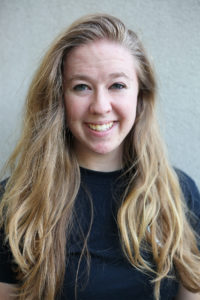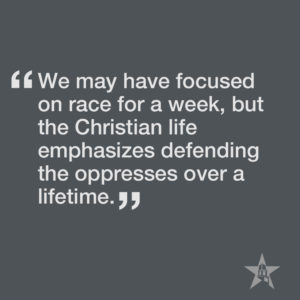Only three short weeks ago we entered CLEW, a time that reminds us that we as a campus are a part of the diverse body of Christ. We went to the chapels, listened attentively during the coffeehouse, and discussed race and the church over dinners, but now, in the weeks following CLEW, we have a question to answer. What are we going to do next? Where do we go from here? CLEW may have ended, but our concern over division on this campus absolutely cannot.
 CLEW was a special time to be hearers of the word that Dr. Meredith Griffin brought, but now is the time to be doers. Before leaving, Rev. Dr. Doris Griffin (the wife and too often overlooked counterpart of CLEW speaker Rev. Dr. Meredith Griffin) blessed my Spiritual Formation class with a poignant and profound word. She said, “When we leave today, y’all are gonna have to live this thing out. You are accountable for your actions on this campus. We’re not, we’re leaving… I challenge you, I challenge all of you, what are you gonna do? What are you going do to make this campus more reflective of the love of Christ?”
CLEW was a special time to be hearers of the word that Dr. Meredith Griffin brought, but now is the time to be doers. Before leaving, Rev. Dr. Doris Griffin (the wife and too often overlooked counterpart of CLEW speaker Rev. Dr. Meredith Griffin) blessed my Spiritual Formation class with a poignant and profound word. She said, “When we leave today, y’all are gonna have to live this thing out. You are accountable for your actions on this campus. We’re not, we’re leaving… I challenge you, I challenge all of you, what are you gonna do? What are you going do to make this campus more reflective of the love of Christ?”
Upon hearing this, I realized how easy it is for us as students, especially us white students, to fall back into complacency; to feel as though we listened attentively, we’re aware and knowledgeable, and we are good allies to our brothers and sisters of color. Here’s the problem: listening to a black preacher for one week out of the semester does not make our campus “woke.” Talking about Charlottesville for a hot second during a coffeehouse does not mean that any racial tension in the Church lessened. If conversations don’t continue, if we don’t use our political voices or privilege (if you have it) then what was the point of CLEW? CLEW is meant to bring a springboard for us to put the rubber to the road and make some changes within our community. That means we are just as called by God this week as we were during CLEW to actively, vocally and spiritually combat racism and division. We may have focused on race for a week, but the Christian life emphasizes defending the oppressed over a lifetime.
 The action we as individuals and as a community take is how things get better. It is in efforts to gather with those who do not look like us or think like us or whatever like us that the Church and we as individuals learn to value diversity while becoming more unified. We can’t value our similarities or celebrate our differences if we never take time to get to know each other and that goes beyond an issue of race. Jesus prioritized those on the outskirts of society and befriended those who God’s people least expected, and as students part of a Christian campus, doing the same is not optional.
The action we as individuals and as a community take is how things get better. It is in efforts to gather with those who do not look like us or think like us or whatever like us that the Church and we as individuals learn to value diversity while becoming more unified. We can’t value our similarities or celebrate our differences if we never take time to get to know each other and that goes beyond an issue of race. Jesus prioritized those on the outskirts of society and befriended those who God’s people least expected, and as students part of a Christian campus, doing the same is not optional.
CLEW is over, but as a campus, as the diverse Church, our responsibility to the oppressed, the silenced, and the unseen is not. So let’s do ourselves a favor… get coffee with someone you don’t know. Stand up when someone says something offhandedly or “jokingly” racist; for that matter stand up when people talk about the kid who is different, when someone says something anti-Semitic, or when someone uses derogatory slang for those in the LGBTQ+ community. You don’t have to change your political or theological views in order to treat people with decency or defend a fellow human. Listen to stories at the Solutions coffee houses that happen on Wednesday nights at 7 in Java. Do something besides letting the momentum and conversation that CLEW started go to waste. Rev. Dr. Doris Griffin said that “a solution is on the horizon.” But if we want it, we have to work for it.
Kyla is a sophomore majoring in intercultural studies.
